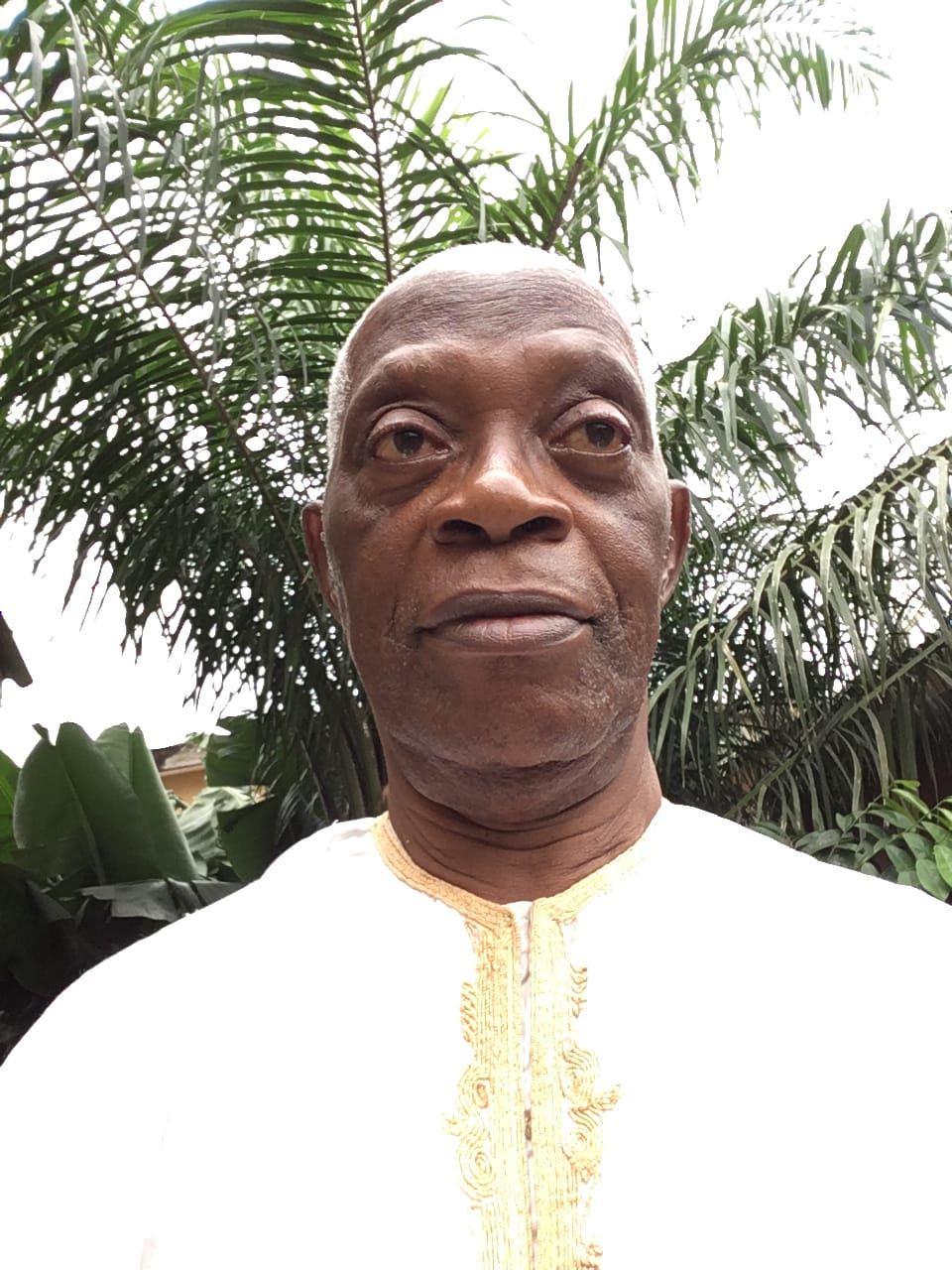
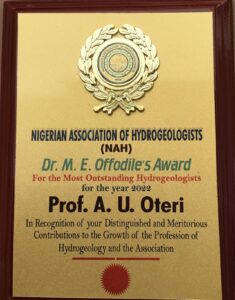
Dr Akomeno Oteri is a retired Hydrogeologist offering consulting services in Groundwater Geophysics, Hydrogeology and Environmental studies. In his early career, he worked as an exploration geologist with ExxonMobil, and after his postgraduate studies, he lectured Pure and Applied Geophysics and Hydrogeology at the University of Ilorin, Kwara State, Nigeria. He was recently conferred with the ‘Dr M.E. Offodile’s award for the Most Outstanding Hydrogeologist of the Year 2022’ by the Nigeria Association of Hydrogeologists (NAH). The Nigerian Association of Petroleum Explorationists also organises a yearly Akomeno Oteri Annual Lecture in its honour as the founding father.
Dr Oteri was eWASH’s maiden guest interviewer, and he spoke to Babatope Babalobi and Esther David on several issues, including groundwater management and other general Water Supply, Sanitation, and Hygiene (WASH) issues.
In the interview, he argued that the Water sector is an industry. He canvassed for multi-disciplinary expertise to manage the water industry; saying, Engineers have taken over the water sector, whereas most Engineers (including civil engineers) in Nigeria do not have full knowledge of Groundwater. He also said it is not right for the Federal Government to Police Nigeria’s Water Resources.
The first question is like a compliment. We read on the internet that you were honoured with the award of the most outstanding Hydrogeologist in Nigeria. We wish to congratulate you on the award. Can you tell us what this award means to you?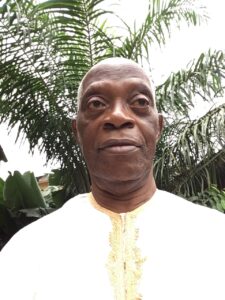
Firstly, let me thank you for this interview. I least expected this, but as you said, I have listened to and participated in your webinars. I first saw some of your webinars and attended a few, then became interested in them. I also need to congratulate you for the past initiatives you have taken and the one you are taking now, and I think we need a lot of publicity in the WASH sector and exposure for people to understand the fact that water is important in the life of every living thing not only human being including plants and animals. Thank you so much for honouring me and being the first person to be interviewed. It is an honour which I humbly accept.
This interview came at the right time. Just yesterday (December 8, 2022), the World Groundwater Summit held in Paris ended, which I attended virtually, and it was an eye-opener for many people and me. The emphasis was on the water, especially Groundwater.
I felt very humbled by the NAH award. I got the honour for this year, and we hope that next year someone else will get the honour. I feel very happy and proud. It is like the Ballon d’Or in football, where your colleagues look around for you and decide to honour you with that award. I feel very humble and grateful and thank them for the honour.
What is Hydrogeology all about? The profession seems not to be very invisible. So, who is a Hydrogeologist?
Hydrogeology is a branch of geology that deals with water. Hydro means water, so we can say Hydrogeology is the geology of water. So, a Hydrogeologist deals with all aspects of water, from water quantity, water quality, getting the water out and using it for various things, either for drinking, irrigation and many other things water is used for, but it is also part of hydrology.
Hydrology mainly deals with the science of water because water occurs in various forms. Some occur on the surface, which we see in the rivers and lakes called surface water. Some occur in the ground, called Groundwater, and some in the air, like snow and rainfall (precipitation). These are all related to what we call the Hydrological cycle.
Hydrogeology is sort of a science in the middle of many things. What affects surface water can affect Groundwater, and what affects Groundwater can affect surface water. When we now talk about management, we would manage all of them together, including the water coming from the air in terms of rainfall.
Hydrogeologists seem not to be visible in Nigeria’s water sector like Engineers?
As I said earlier, water is not only about surface water. Engineering is broad. Geologists are mostly based in the Oil and Solid minerals mining industries, government agencies such as the Nigeria Geological Survey Agency (NGSA), Nigeria Hydrological Services Agency (NIHSA), the River Basin Development Authorities, Academia and Private Consulting Companies especially dealing with borehole exploration and drilling. In Nigeria, geologists are mostly recognised in the oil industry.
Water supply is not only about surface water
All the water resource units in the relevant ministries and Water Corporations/Boards should employ geologists at all levels to carry out groundwater data gathering, regulation of boreholes and monitoring.
Unfortunately, many Water Supply agencies, including those with large areas underlain by sedimentary rock, hardly have hydrogeologists as staff, with some in management positions. For instance, in Ogun State, half of the State is underlain by sedimentary rocks. Nevertheless, they have an insignificant number of hydrogeologists on their staff. Unfortunately, engineers dominate the Nigerian water supply industry, while Engineers, including civil engineers in Nigeria, do not have deep knowledge of Groundwater hydrology.
Is it that Hydrologists consider themselves inferior to Engineers in the water and sanitation sector?
In Nigeria, there is this mentality that if you are an Engineer, you know everything. They do not think they need people’s input in other fields. Hydrologists are definitely not inferior to Engineers in the water and sanitation sector. No one professional group is superior to the other as they are all parts of the same body performing different but essential complementary functions. Just like parts of the human body, you cannot say the mouth is superior to the anus or the eye superior to the kidney. The vast water and sanitation industry requires various professional groups to work together. Engineering covers many areas in the water industry, which probably gives the false impression that engineers are superior to other professional groups.
All professional groups are important and must be given due recognition for the sector to work efficiently. Most importantly, the whole group must blend through training, seminars, etc. “The engineer knows all mentality” is false. Because you read B.Sc. or M.Sc engineering, you should be an expert on roads, water, everything, or geology, so you should be a water expert, solid minerals, oil et al., without immersing yourself in learning about the particular sector is a wrong mentality.
What would you recommend as an ideal management structure for a water corporation in terms of top management, as there is an argument that an Engineer Managing Director best manages a water utility?
Anybody in the water industry must know that this industry needs different expertise from various backgrounds. Any competent well trained professional can be the Managing Director of a water utility so far he/she has had the relevant industrial /management training and experience in the particular industry. The top management should include competent persons irrespective of their initial degree once they have the necessary industrial and management training. In the Oil Industry in Nigeria and internationally, no professional group claims to be the Managing Director. Nigerian National Petroleum Corporation (NNPC) has had about five Geologists as the Chief Executives over the past 50 years, while most of the Indigenous Oil Companies, like Seplat PLC, have been headed by Geologists. Geologists have headed even Integrated Oil Companies (IOCs) like Shell International and ExxonMobil in their headquarters at one time or the other.
THE WATER SECTOR DOES NOT BELONG TO ENGINEERS ALONE
One trait which I find disturbing in Nigeria is assessing professionals based on the degree they read. You take a geologist who had spent, say, 5 years in Water Corporation and transfer him/her to head a Solid Mineral Exploration department and after another 5 years, transfer him/her to an agency in charge of building control ( foundations). He or she may be a good administrator but not versed enough to understand an important industry such as a Water Utility.
So, you are saying that the water sector does not belong to the Engineers alone?
It does not. It is important to get expertise in various fields.
Why Boreholes fail
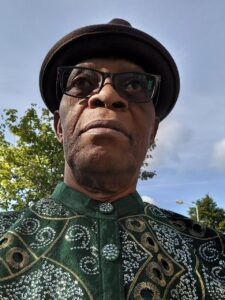 On the issue of boreholes, one of the key issues is that most of the boreholes in Nigeria are not sustainable. Many boreholes collapsed. Can we say that Hydrogeologists are responsible for the high rate of non-sustainability of boreholes in Nigeria?
On the issue of boreholes, one of the key issues is that most of the boreholes in Nigeria are not sustainable. Many boreholes collapsed. Can we say that Hydrogeologists are responsible for the high rate of non-sustainability of boreholes in Nigeria?
Definitely Not – Hydrogeologists are not responsible for Nigeria’s high rate of non-sustainability of boreholes. Instead, we must ensure that boreholes drilled are successful and sustainable. Getting successful boreholes is a process of many steps. It starts with detailed studies to show what particular location and how deep you need to go before getting water. The next thing is the construction. It is necessary to have people properly trained and experienced having the appropriate equipment to do the drilling with the Borehole completed according to specifications with good quality materials. Furthermore, in maintenance, it is important to maintain the Borehole regularly. Some boreholes have been in operation for twenty to thirty years in Nigeria, and it is because they were drilled well, maintained and monitored regularly.
What is the role of the Nigerian Association of Hydrogeologists? If I want to drill a borehole, who do I go to as a layman, so I do not become a victim of quacks?
The Nigerian Association of Hydrogeologists (NAH) is a scientific and educational charitable organisation for scientists, engineers, water managers and other professionals working in groundwater resource planning, management and protection. It was founded in 1976 and is affiliated with the International Association of Hydrogeologists (IAH). The mission of NAH is to further the understanding, wise use and protection of groundwater resources in Nigeria in general and throughout the world.
The aims of IAH and NAH are stated as follows:
‘IAH aims to be a leading international society for the science and practice of hydrogeology and to be a globally recognised information source and facilitator for the transfer of groundwater knowledge. We endeavour to raise awareness of groundwater issues and work with national and international agencies to promote the use of Groundwater to ensure ready access to safe drinking water. IAH also promotes the protection of aquifers against pollution, the improvement of aquifer storage and the management of groundwater resources to assure the sustainability of groundwater-dependent ecosystems’
IF YOU WANT TO DRILL A BOREHOLE, CONTACT AN HYDROGEOLOGIST
As a layman, when you want to drill a borehole, the best thing is to go to a Hydrogeologist so that he will be able to identify where you are likely to get water from. It is easy to know where exactly to get water at a particular place from existing data combined with field exploration involving surface geophysical and hydrogeological surveys. Even if you go to a good driller, he will tell you he must conduct a survey before drilling. The best option is to go to a professional Hydrogeologist. A drilling firm should have a Hydrogeologist as part of its staff.
Another issue with boreholes is that drilling costs are not fixed or regulated. How can this problem be solved?
Borehole drilling costs depend on the specification, that is, depth. Materials used and tests to be performed. Some boreholes are just a few meters deep. They are drilled so they can be for flushing the toilet or so, so they will not be very deep, and since it is not deep, the materials used will be cheap. The depth and the materials to be used are major factors of the cost. Depending on the area, you can drill a borehole up to twenty meters or less. Even in basement complex ( hard rock) areas, people are drilling up to two hundred meters because the technology has improved, while in sedimentary areas, boreholes are drilled to an average of 220 m in coastal areas of Lagos like Ikoyi and as deep as 720 m in Ikeja. Therefore, the cost can never be the same
Many factors go into it. For example, food companies drilling their boreholes use stainless steel materials, making the cost very high. Still, most people will not use that because it is very expensive. Generally, I want to state that both individuals and Governments in Nigeria allocate an infinitesimal percentage of the cost of a borehole scheme to the “borehole”- (investigation, drilling and drilling supervision).
The bulk of the costs of a scheme goes to the “surface infrastructure- Tanks, Reticulation, buildings and water treatment. However, if the Borehole fails – No water coming from the Borehole or poor water quality such as salinity- All the” Surface Infrastructure “becomes moribund. I advise that a greater percentage of the cost of the borehole scheme money should be spent on the Borehole – subsurface structure.
There is this general perception that there are too many boreholes in Nigeria. A few years ago, it was stated that there could be cases of land subsidence in places like Lagos, Ibadan or West African states because of the proliferation of boreholes. Have some studies confirmed this?
There is a general perception that there are too many boreholes in Nigeria. It is difficult to say whether they are too many or there is a lack of data on the number of boreholes, how many are working, and where they are located. I agree that there is indiscriminate and unregulated drilling of boreholes in Nigeria, with no data collected and submitted for the boreholes. This is very dangerous.
If you have many or few boreholes taking too much water from the aquifers more than what is occurring and replenished (recharged), especially in sedimentary areas, water levels of the aquifer will decline (fall), followed in many cases by land subsidence. This happens in many world countries such as Bangkok, Thailand, Houston, Tx, San Joaquin valley CA, Jakarta, Indonesia and Mexico City, Mexico, to mention but a few.
We do not know the number of boreholes in Nigeria
Groundwater depletion due to the over-pumping of boreholes apart from land subsidence can lead to increased flooding and saltwater intrusion from the Ocean in coastal areas. There are numerous examples of this in the world. 9 m was measured between 1925 and 1977 in San Jaoquin Valley, CA; land subsidence between 0.25 and 4.1 m in Jakarta, Indonesia, has been determined. In Nigeria, they think there is subsidence somewhere like Lagos because there are many boreholes, and they are taking water, and nobody knows how much water they are pumping. Even some companies do not have water meters to know how much water they are pumping out. In a good system, after drilling, a borehole must be tested to know the amount of water available before pumping. So, if there are too many unregulated boreholes, it gives rise to subsidence.
Nearly all over the world, no one wakes up, drills a borehole, and plumps as much as he/she likes. There are regulations. Permits are taken to drill and abstract Groundwater. Most importantly, there are boreholes where monitoring water levels and quality are taken regularly and sometimes 24/7 by Smart techniques. Land elevations are measured, and therefore, if land subsidence is occurring, it will be detected, and the rate of subsidence determined
We need regulations to know the number of boreholes in the country. We need to monitor them to know the water quality and variations in the water level. There should be coordination at the state and federal levels.
Have any recent studies in Lagos or Nigeria confirmed the existing situation?
We had some studies in the late ’70s. In the late 70s, many industries in Ikeja, Apapa and Ilupeju were pumping water, and they monitored the water level. In those years, they found evidence of water level declining in some areas, meaning they were pumping too much water from the aquifers, which can give rise to saline water intrusion in the coastal area and land subsidence. Nigeria Hydrological Services Agency ( NIHSA- an agency of the Federal Ministry of Water Resources) currently has 77 monitoring boreholes in Nigeria, with about 60 per cent functioning. Two of these are in Lagos State, with only one working for the past few years. The number of monitoring boreholes is far too few for a large country like Nigeria.
A Professor at the University of Cardiff in the UK is conducting collaborative research with some Professors at the Universities of Ibadan and Lagos alongside Hydrated Geo Consulting Services, monitoring water levels and water quality in some boreholes in Lagos State. This research has been going on for about a year now and continues. These studies need to be done regularly. The Federal Ministry of Water Resources, through NIHSA, has set up a Committee working on how to ramp up groundwater monitoring in Nigeria. This committee consists of hydrogeologists from both the public and private sectors, as well as the Universities.
This is the major reason for licencing and not money making. Nigeria is a federation of States. Therefore, state agencies should license the drilling contractors, boreholes and abstraction, collect the data and share this information with the Federal agency. Nigeria’s best water governance system is for the states to carry out the primary regulation. The drillers will register with the States and submit all the data to the States.
The Federal Government should not Police Nigeria’s Water resources
This is the international best practice and obtains in Countries with a Federal system of government like the USA, Canada, Germany, Australia, India and Pakistan to mention a few. We do not want “A Nigeria Police type of Governance structure “in the water sector, where Abuja is in control from Okuku in Cross River State to Ivori-Irri in Delta State, to Unguwar Kaga in Katsina State to Lagos State. This is my view, and I hold it.
One of the issues of boreholes regulations in Nigeria is the duplication of regulatory bodies. Which tier of government do you think is best for issuing water well drillers’ licences? Is it the Federal Government or the State Government?
In my opinion, firstly, we need to have agency/agencies licencing drillers. The major aim of licencing a driller is not about the money but getting the borehole data. Once you licence the driller, it is on him to give the data to the agency because it is very important. Many things will go wrong without knowing the number of boreholes, how much water is being taken, and the geology.
Borehole licensing should not be for making money
This is the major reason for licencing and not money making. Nigeria is a federation of states. Therefore, state agencies should transfer this information to the Federal agency. The best system is for the state to be in primary regulation. That is, the drillers will register with them and send them all the data, and the agency will be able to monitor the borehole’s water level and quality. This is my view, and I hold it strongly.
FG should not regulate transboundary water
What are your views on the National Water Resources Bill?
Firstly, I am a great supporter of the National Water Resources Bill. Secondly, things I do not agree with – water from the surface or aquifer going from one State to the other has to be regulated by the federal. The States should do this. States will cooperate with Federal Agencies and amongst themselves.
To make that document acceptable, what special provision do you need to be re-drafted?
- Part I Sections 2(1) and 2(2)- States should regulate and manage all waters in their territory cooperating with FMWR and its agencies. There should be no discrimination between waters domiciled only in the State and those crossing from other States.
- No water resources should be designated Federal, especially by that definition. Many of the 36 States and the FCT do not have any water resources limited to their State alone. Every water there is federal.
- Some sections in Parts III, IV and V, will need to be changed.
- Many of the items in Part V Section 62(i) to 62(s) are already being regulated by other Ministries, Departments, and Agencies (MDAs) of Governments, especially at the Federal level. Having them in this Bill will be duplication and triplication.
Many practitioners, especially those managing the utilities, do not seem to value boreholes. Solving Nigeria’s water crises and accelerating water coverage in Nigeria, do you think it lies in Groundwater or surface water?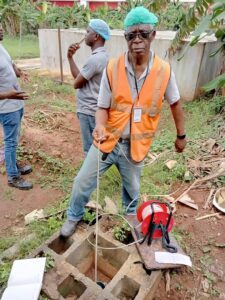
It lies in between Groundwater and surface water, depending on the most viable. In a particular area. There can be situations where you use the Groundwater and then use the surface water to recharge the Groundwater. Sometimes, you might even use both of them in what is termed conjunctive water management).
Many practitioners in Nigeria do not value boreholes due to “Groundwater being invisible”. It is, however, mainly due to their lack of knowledge about Groundwater. As I stated earlier, the engineering curriculum in Nigeria contains very little groundwater hydrology, and these engineers have not availed themselves of available training after graduating to know more about the water industry. No city in Nigeria does not have a good proportion of its water supply from Groundwater, including Abuja Municipal Area. In Lagos metropolis. Over 60 per cent of the population depends only on Groundwater ( Ikorodu, Epe, Lekki, Ikoyi, Victoria Island et al.).
- Many Bottled water and Pure Water firms in Nigeria, up to 98 per cent, depend on Groundwater.
- Many industries in Lagos, as well as in Port Harcourt, Warri and many other cities, depend on Groundwater.
- Even Calabar, with a Surface water scheme, depends largely on Groundwater.
- Internationally, Germany depends about 70 % on Groundwater, while Denmark depends fully on Groundwater.
- Also, Groundwater accounts for about 75% of water use in Beijing, China.
Nice interview with Mr. OKOMENO Oteri.
I am a water engineer with the Red Cross and I carried out two missions in the South in EDO State; then I traveled through several States including Bauchi, Kogi, Bayelsa, Delta.
I noticed that practically all the water from the boreholes contained iron; can I have an explanation on such a large expanse of territory.
I was also in Adamawa State but there I was in many villages to observe this phenomenon
Nice interview with Mr. OKOMENO Oteri.
I am a water engineer with the Red Cross and I carried out two missions in the South in EDO State; then I traveled through several States including Bauchi, Kogi, Bayelsa, Delta.
I noticed that practically all the water from the boreholes contained iron; can I have an explanation on such a large expanse of territory.
I was also in Adamawa State but there I was in many villages to observe this phenomenon
Very Insightful interview, I am a hydrogeologist from Namibia working in the Ministry of Agriculture, Water and Land Reform. Its work noting that majority of the concerns mentioned, we are also experiencing. What stood out for me is really the advise to allocate a greater % of the cost to the actual subsurface structure (Borehole).